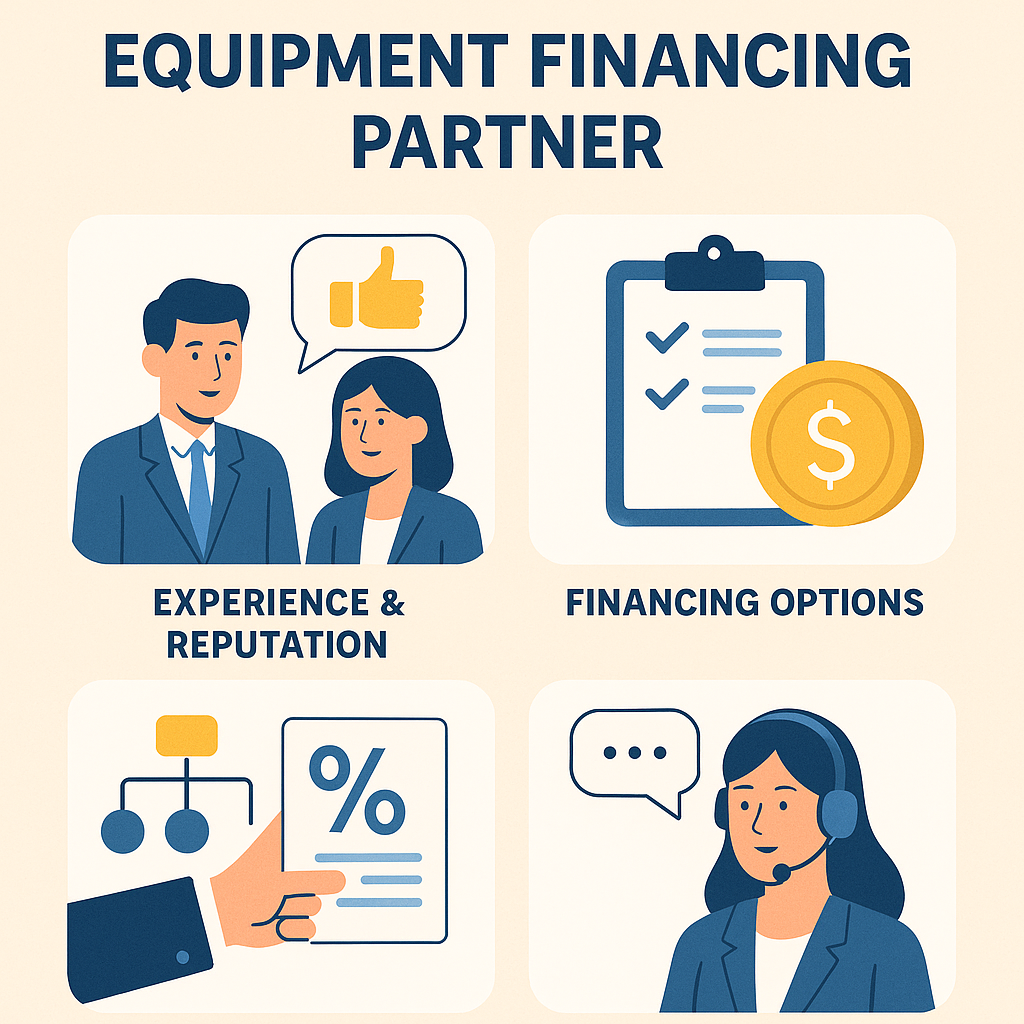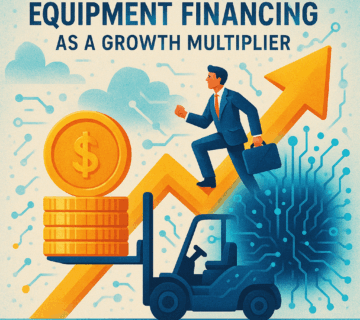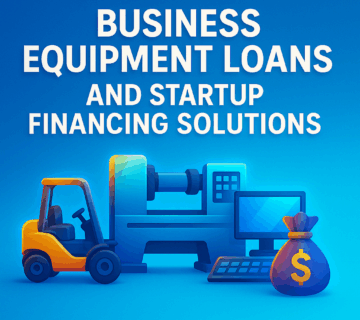How Equipment Loans Can Help You Win Bigger Contracts
Introduction: Why Financing Equipment Is the Shortcut to Bigger Wins
For many small businesses and startups, the biggest obstacle to landing high-value contracts isn’t talent or ambition—it’s access to the right equipment. When you lack the tools to execute larger projects, clients may pass you by, no matter how capable your team is.
That’s where equipment loans come into play. This form of financing has become a critical business growth tool, especially in 2025. With startup equipment financing now more accessible and streamlined, entrepreneurs and small business owners are finding it easier than ever to expand their operations, boost efficiency, and win contracts that used to feel out of reach.
Let’s break down how leveraging easy equipment financing can give your business the boost it needs.
Understanding Equipment Loans: A Business Investment, Not Just Borrowing
An equipment loan is a financial product designed specifically to help businesses purchase tools, vehicles, machines, or technology essential for their operations. Unlike traditional loans, the purchased equipment itself often serves as collateral, reducing risk for the lender and providing more favorable terms for the borrower.
This arrangement offers startups a tremendous advantage. With equipment financing companies for startups offering flexible packages, even newly formed businesses with limited credit histories can get the tools they need without depleting cash reserves.
These loans can cover almost any kind of business asset—from industrial machinery to food trucks, medical devices, and construction tools.
How the Right Equipment Helps Win Bigger Contracts
If you’ve ever lost a bid because your capabilities didn’t meet client requirements, you’re not alone. Contracting opportunities, especially in sectors like construction, logistics, agriculture, and healthcare, often come with specific equipment prerequisites.
Bigger contracts typically mean more complex projects, larger scopes, and tighter deadlines. Businesses need advanced, reliable tools to deliver results efficiently, meet compliance standards, and handle volume. When you can’t show that you’re equipped to deliver, your proposal ends up in the rejection pile.
Here’s how startup equipment financing changes the game:
- Enhanced Capacity: Take on multiple projects at once.
- Professional Image: High-tech tools demonstrate capability and modern operations.
- Improved Performance: Modern equipment increases efficiency, safety, and accuracy.
- Compliance-Ready: Meet industry-specific regulatory standards faster.
With these upgrades, you not only qualify for more contracts—you become a top contender.
Why Startups Should Consider Equipment Financing Early
Starting a business is hard enough without worrying about how to afford expensive tools. That’s why equipment financing for startups has emerged as a fast-track to growth.
Many best equipment financing companies now provide customized loan and lease packages specifically tailored for early-stage businesses. They understand that a startup may not have deep financial records but can still offer great value to customers with the right support.
Financing also helps startups:
- Conserve Cash: Keep money in the bank for marketing, payroll, and growth.
- Maintain Ownership Flexibility: Choose between leasing or owning equipment.
- Build Credit: Establish business credit with manageable monthly payments.
- Adapt Quickly: Upgrade or swap equipment as your needs evolve.
How Easy Equipment Financing Fuels Fast Growth
When you choose the right lender, the process is often smoother and quicker than you expect. Many easy equipment financing providers operate online, offer digital applications, and deliver approvals in under 48 hours. These platforms simplify everything—documentation, quotes, contracts, and even repayment scheduling.
More importantly, they remove the friction from the purchasing process. Instead of waiting months to save up, you can secure the equipment you need today and start bidding on contracts tomorrow.
This speed gives you a serious edge in competitive markets.
Real-Life Wins: Businesses That Scaled Using Equipment Loans
Let’s look at how some startups and small firms turned equipment financing into success stories:
A Delivery Startup Goes Regional
A new logistics startup in Texas used equipment financing to lease refrigerated vans. Within six months, they expanded routes across three states and landed a seven-figure contract with a regional food supplier.
A Tech-Based Cleaning Service Takes on Hospitals
An eco-friendly cleaning startup secured funding for high-efficiency floor scrubbers and UV disinfection units. This move helped them gain contracts from two major hospitals who required industrial-grade sanitation technology.
A Construction Firm Breaks into Government Projects
A small construction company struggled to land government infrastructure projects until it financed a set of bulldozers and road pavers. Within one year, they were completing public works projects valued at over $5 million.
Debunking Common Myths About Equipment Financing
Despite the benefits, many business owners hesitate due to misconceptions. Here are the most common:
Myth 1: “I’m too new to get approved.”
Thanks to equipment financing startup programs, many lenders now cater specifically to young companies. If you have a solid business plan and basic documentation, approval is absolutely possible.
Myth 2: “It’s just more debt.”
When used strategically, equipment loans are an investment—not a burden. If a $50,000 machine helps you land a $500,000 contract, the ROI speaks for itself.
Myth 3: “Leasing means I lose money.”
Not always. Leasing can offer tax advantages and flexibility to upgrade as tech evolves—often better than owning depreciating assets.
Tips for Choosing the Best Equipment Financing Companies
Choosing the right lender is as important as choosing the right equipment. Here’s what to look for:
- Experience with startups – Many lenders specialize in startup equipment financing, understanding the unique challenges of new businesses.
- Flexible payment plans – Look for seasonal adjustments or revenue-based repayment models.
- Transparent terms – Avoid lenders with hidden fees or confusing clauses.
- Customer support – A lender that provides guidance is often a better long-term partner.
Reach out to several lenders and compare not just interest rates, but also their approach, support, and speed of funding.
FAQs About Equipment Financing for Bigger Contracts
Q1: Can I qualify for equipment financing without strong credit?
Yes. Many lenders offer options for startups with fair credit, especially if the loan is secured by the equipment.
Q2: How fast can I get equipment financing approved?
Some platforms provide approval in 24–48 hours, especially with digitized applications and minimal paperwork.
Q3: Is equipment leasing better than buying?
It depends. Leasing works well for rapidly evolving industries or short-term projects. Buying is better for long-term assets.
Q4: Are there any tax benefits to financing equipment?
Yes. Section 179 of the U.S. Tax Code may allow you to deduct the full cost of qualifying equipment in the year of purchase.
Q5: Can equipment financing improve my chances of landing contracts?
Absolutely. Having the right equipment signals professionalism, readiness, and scalability—all attractive traits to potential clients.
Q6: Where can I find lenders who work with startups?
Start with best equipment financing companies like Crest Capital, Taycor Financial, and National Funding, which offer tailored plans for new businesses.
Conclusion: Equip Your Business for the Big League
Equipment loans are more than just financial tools—they’re growth enablers. Whether you’re a new business looking to gain traction or a small company aiming for bigger contracts, leveraging equipment financing for startups can catapult your operations to the next level.
With modern lenders offering easy equipment financing and tailored solutions for businesses at every stage, there’s no reason to hold back. Equip your team, pitch with confidence, and position your company to win the contracts that matter most.





No comment